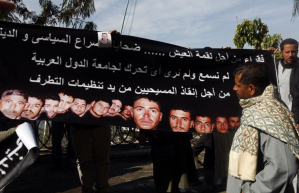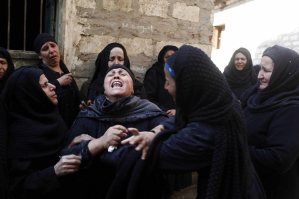
The terror group known as ISIS has conducted gruesome killings as part of its propaganda campaign to spread its version of Islam across the Middle East. Although the Islamic militants started their operations in parts of Iraq and Syria, their influence has stretched beyond that region to Libya
According to Todd Daniels of International Christian Concern, the call of ISIS has stretched out to other parts of the Middle East, especially in North Africa. The situation is particularly acute in Libya, where militants have subjected Christians and other minority groups for persecution and execution; it is also the same country where both economic migrants and displaced refugees flee to Europe in search of a better life.
"Libya is a major transit point for those fleeing into Europe," Daniels wrote via email. "Many of those who pass through there are Christian minorities (such as those from Eritrea) who are fleeing hostility in their own lands and are seeking better economic opportunities in Europe."
However, Daniels pointed out that Egypt's Coptic Christians had their reasons for working in Libya, despite the risk of persecution and harassment.
"In the case of the Egyptians, it was the opportunity for well-paying jobs that led these men to face the risks of working in the war-torn land," Daniels wrote. "But rather than becoming victims to a general conflict, Christians have been singled out and martyred for their faith."

Daniels added that the ICC knew of "seven other Egyptians who've been abducted in Libya." Their fate remains unknown at this time.
"We urge the Egyptian government and the international community to take action to provide safe passage for those seeking to exit Libya," Daniels wrote.
Daniels then mentioned that the ICC was in partnership with the Egyptian Commission for Rights and Freedoms, or ECRF, in regards to the plight of Christians in Libya. That organization posted a YouTube video with English subtitles entitled "Forgotten in Libya," which detailed their plight.
"We heard voices saying we want the Christians in the residence," one Egyptian man said in Arabic. "They took the people and left, and when the Libyan man asked them, 'Why are you taking them?' they answered that they had orders from their leader to take all Copts living here."
Narrator Farouk El Helbawy described in Arabic the current situation for Egyptian Christians in Libya.
"It still hasn't finished yet," Helbawy said. "We still have another seven workers kidnapped since last August and September last year, with an unknown destiny until now."
Helbawy added that of the seven people, four Coptic workers were kidnapped as they tried to go back home to Egypt. The rest were composed of two Egyptians and a Muslim who disappeared as they left their work.
"ECRF has warned [that] the kidnapped Coptic workers' situation in Libya [is] getting worse," an ECRF official said. "Finally, it ended with the famous video of the victims' murder, which was published on the Internet. Unfortunately, until the last moment, the Egyptian authorities were ensuring that the victims were still alive."
ECRF then turned to the latest kidnappings.
"Until now, the Egyptian authorities failed to deal with the crisis and couldn't reach any information, and the same situation we faced in the murder of the first 20 Copts, is facing us now," the ECRF official said.
The relatives of the kidnapped victims indicated to ECRF that they were getting the runaround from government officials in Egypt in attempts to learning about the status of their loved ones.
"We met an official, and again we only got diplomatic answers with no real solutions," a relative said.
"We knew from some people that they are in a prison in Tarablus city," another relative said. "We went to the foreign ministry and told them this information, and they didn't do anything and couldn't reach them."
However, ECRF managed to secure some information about the victims' status.
"The victims' families were able to get a lot of information, and they sent it to the authorities through us and through direct contact with the foreign ministry," the ECRF official said.
The video ended with pictures of the kidnapped victims in the hope that the Egyptian government, along with the rest of the world, do not forget about them.






